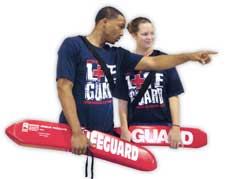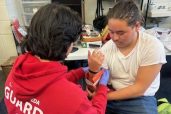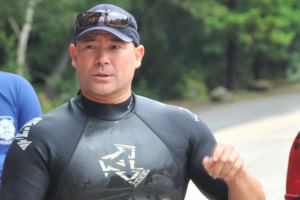Each spring at pools across the country, aquatics administrators begin to hire lifeguards. Once this hiring is complete, the staff typically consists of a mix of veteran returning guards and newly certified (and often very young) guards. Though all these guards have completed certification courses, facility-specific training is still needed.
But regardless of the thoroughness of your new-staff orientation or the number of in-service training sessions your guards attend, one important aspect that cannot be addressed is experience. CPR, first aid and rescue skills can be mastered in a lifeguard certification course and practiced repeatedly during in-service training sessions. However, highly skilled but inexperienced guards fall short in the areas of victim recognition, rules enforcement and preventive guarding. These skills can be best developed while on the job.
Even after detailed discussions on these topics in certification courses and during orientation sessions for new hires, inexperienced guards often are still ineffectual in these areas. When asked why they aren’t preventing situations or can’t recognize victims, they’ve actually responded that they are “not quite sure what to look for.”
Developing a Lifeguard Mentor Program can help with this problem.
The objectives of the Lifeguard Mentor Program are to:
- Assist newly certified lifeguards in becoming effective in terms of preventive lifeguarding, victim recognition and rules enforcement.
- Provide further assistance beyond the initial new-employee orientation for newly certified and/or experienced lifeguards who are new to the facility.
- Reinforce all those skills and abilities that should be exhibited by an effective, veteran lifeguard.
Begin by holding a meeting with your experienced guards only. They will serve as mentors and should be paired with inexperienced guards. It works well to allow the mentors to choose the individuals with whom they’d like to work. You can make suggestions as well, based on personalities or other factors you deem important. Then explain the program to these seasoned guards, allowing time for questions, suggestions and discussion.
The first phase of the Mentor Program should occur approximately a week or two after opening. At this point, new guards should have gone through orientation and have some experience at your facility under their belts. During this phase, mentors will meet with mentees to review some general information. While all this data should have been covered during the orientation, I’ve found it is helpful for mentors to review it again.
Like any new employee, the guards will be overwhelmed by the orientation information and often retain very little of it. Of course, you can add or delete information as necessary based on your specific needs.
Here’s the list I ask my mentors to go over with their mentees:
n How to blow the whistle (it seems obvious, but many guards do not know how to blow a sharp, loud blast)
- How to add/remove lane lines
- Content/location of first aid kits; location of backboard, bag-valve mask and AED, phone
- Emergency action plan and EAP activation signal
- Zone coverage and guard rotation system
- Weekly schedule and days-off requests
- How to fill out accident report forms and any other paperwork
- How to wear the rescue tube appropriately (while in the guard chair and on foot patrol)
- Water testing
- General pool rules, including diving well rules
- Hazard areas specific to your facility
- Victim recognition (what do drowning and distressed swimmers look like?)
- Preventive lifeguarding (typical things to look for at your specific facility, such as non-swimmers moving hand over hand down the pool wall from shallow to deep water and the like.)
It is helpful to develop a checklist for the mentors that includes all the things you want them to reinforce, to be sure they do not forget anything.
During the second phase, mentors must be scheduled to work the same days as those they will be mentoring. It’s not always feasible to schedule them for exactly the same shift every day, but they should be paired as much as possible.
While off-duty, the mentors can use your checklist to discuss specific items with their mentees. While on-duty, the mentors shadow the neophytes for the entire shift and assist them with surveillance. (The mentors should be wearing rescue tubes as well.)
Also while shadowing, the experienced guards point out things that effective guards would be looking for, such as hazard areas, weak swimmers, nonswimmers moving toward danger, patrons breaking rules and so forth. A main purpose of the shadowing is for the mentors to identify actual situations as they occur. For example, if the inexperienced guard fails to notice a nonswimmer moving toward deep water, the mentor points this out and the new guard takes preventive action.
This shadowing can take place for as long as you feel necessary, but the time needed often varies from person to person. In some cases, older (college-aged), but inexperienced guards catch on very quickly and may only need to be shadowed for two or three days. At times, the younger, 15-year-old guards may need to be shadowed for a week to 10 days.
At my facility, the mentors and mentees have responded positively to our Mentor Program. The experienced guards have told me that it makes them “feel more sure of themselves,” and that they feel “a responsibility as a role model toward the one they are mentoring.” The inexperienced guards have said it has makes them “feel more comfortable.”
Not all of my experienced guards are asked to serve as mentors for obvious reasons — a fact that does not go unnoticed by them. In many cases, this has made them step up, which has been an unexpected byproduct of this program. It has become somewhat of an honor to the guards to be asked to serve as a mentor, a role they take very seriously. Many of them come to me early to let me know who they wish to mentor.
Unfortunately, lifeguards seldom get the recognition they deserve, and often we only have them in our employ for short periods of time. So anything we can do to acknowledge their dedication and hard work is essential. The Lifeguard Mentor Program is at least one thing you can do to recognize the effective guards on your staff.


